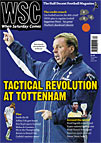 Russian side Krilya Sovietov have two Korean players – one from the North, one from the South. As Saul Pope reports, it's a bit tricky
Russian side Krilya Sovietov have two Korean players – one from the North, one from the South. As Saul Pope reports, it's a bit tricky
On Friday May 2, 2008, a small piece of history was made following a late substitution by Krilya Sovietov in a Russian Premier League game. When North Korean Choe Myong-Ho came on to join South Korean team-mate Oh Beom-Seok, it was the first time footballers from both halves of the peninsular had played for the same team.
Koreans raised in Japan have played at international level for the North, but Choe’s move to Russia in 2006 made him the first North Korea-born footballer to sign for a foreign club. It was a thoroughly modern rather than politically motivated move – with only a small transfer budget, and struggling to keep up with the big-city teams, Krilya had decided to look to uncharted territory for cheap imports. Choe came with a reputation, having previously interested Real Madrid and been voted the 2005 Asian Young Player of the Year.
Two years on, things haven’t quite worked out. Choe has featured in just one cup game, and played only a solitary minute in the Premier League (on May 2). One of the main reasons for his lack of progress would seem to be the huge cultural barrier, which he is either forbidden, or unwilling, to overcome. He lives at the club’s base and doesn’t mix with his team-mates – one paper reported how Choe and his Korean translator hid as the team left the base to go bowling, only coming out when they’d left. When asked about his impressions of other countries in an interview, the player said that he was only interested in “sporting results” when abroad.
Real’s interest in Choe apparently ended when they realised he would be accompanied by a “translator”. Although this is Chen Dal-Han’s official description, he initially struggled to understand Russian journalists, claiming that he had picked up the language when working in Kiev. He has denied being a North Korean agent, but goes everywhere with Choe, answers for him in interviews and has insisted that the two live at the training base. In his words, this means valuable time isn’t wasted on travelling, but it also means that Choe still knows little Russian and even less about the country he lives in.
Choe’s stay almost came to an abrupt end in January, when the transfer of Oh was announced. Choe and his translator suddenly disappeared – even official attempts to contact them proved futile. They returned right before the beginning of the season, claiming Choe had been with the national team, though the disappearance would seem to have more to do with official concerns over whether he should work alongside a South Korean.
At a time when even the sporting relationship between North and South is worsening (they didn’t march together at the Beijing Olympics, as they have done in the past), it was perhaps too much to hope that the two would become friends. PlayStation fan Oh has fitted in well in Russia. “I’m fine with him,” he has said of Choe. “I just don’t speak to him.” Choe for his part has praised Oh’s professionalism, but special agent Chen explained why the two rarely speak: “When could we speak to him? He plays for the first team, and Choe plays for the reserves. There’s no opportunity and no time.”
Although ostensibly bought as “one for the future”, Choe is now 20. In his rare interviews he talks about little apart from training hard and making the first team, but this hasn’t impressed his manager. “There will be changes if he convinces me he’s good enough, but at the moment I don’t know when he’ll play,” Leonid Slutsky says. Choe’s low wages, rumoured to be $1,000 per month, and perhaps a promise made to Kim Jong-Il himself (Krilya officials had an audience with the “Great Leader”) may mean the club keeps Choe for now, but it would be a rare player who progressed in such difficult circumstances.
Another North Korean, Hong Yong-Jo, has recently moved to Russia, though things have worked out better for him. Having signed for Rostov this summer, he quickly established himself as a first-team regular at a club making an instant return to the Premier League. The only problem Rostov have had with Hong is his tendency to undertake secret extra training, leaving him tired during matches – he was recently “punished” by being made to take a day off. He has been in good form for his country too, top scoring as North Korea made it to the final stages of 2010 World Cup qualifying.
North Korea are in a difficult final group – two from South Korea, Iran and Saudi Arabia seem the likely automatic qualifiers – though a promising start means that at the time of writing only goal difference keeps them off top spot. If they do qualify, Hong will surely be on the plane to South Africa. It remains to be seen whether he will be joined by Choe, the former Real Madrid target who cannot convince his club manager that he should get a game.
From WSC 262 December 2008